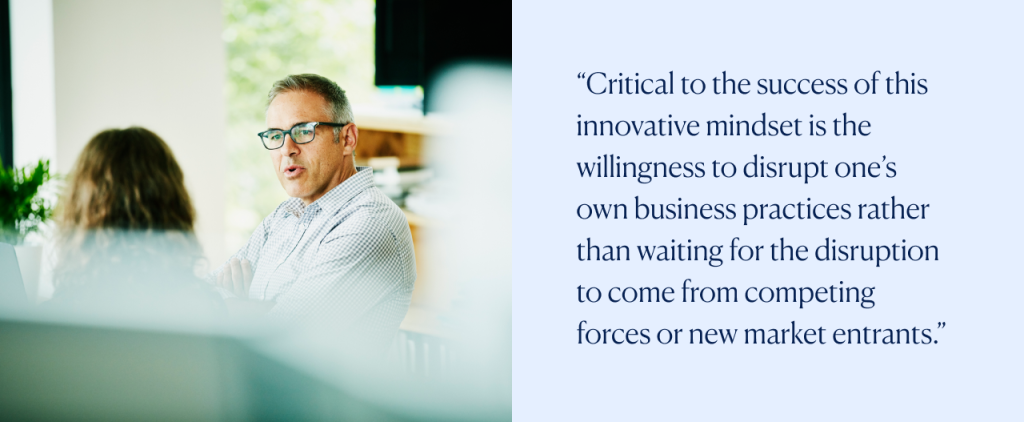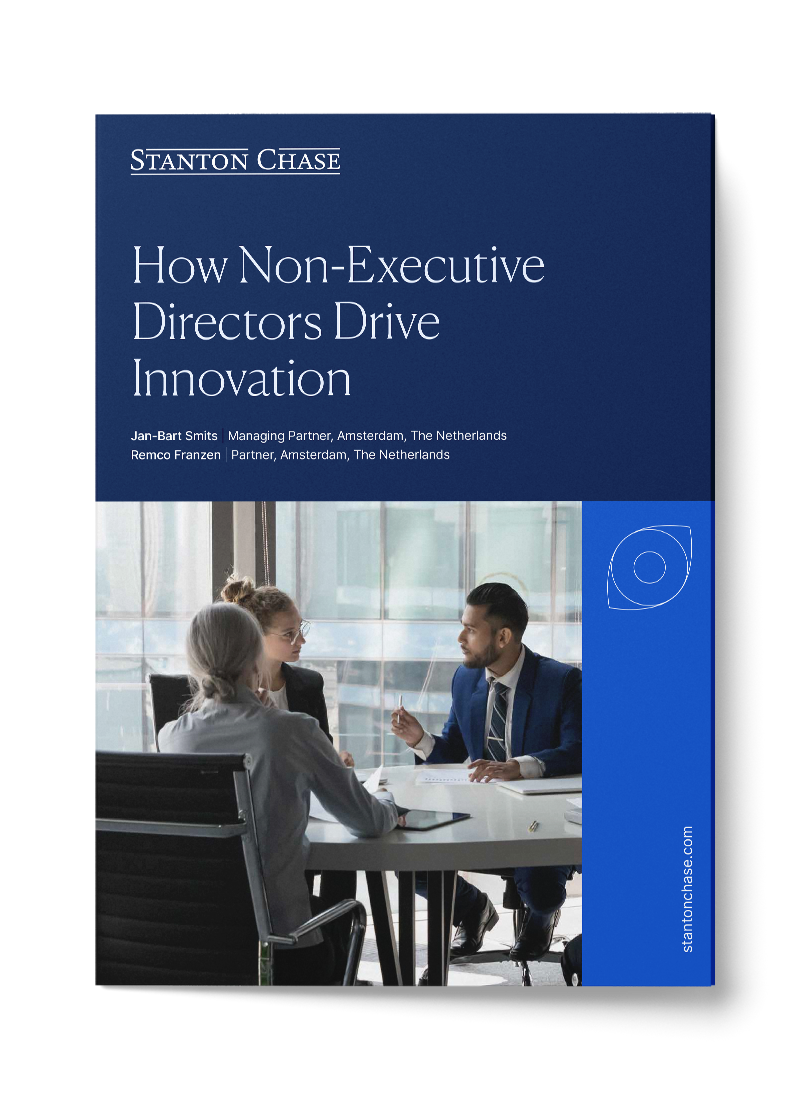
Theodore Levitt once said, “Creativity is thinking up new things. Innovation is doing new things.”
Skeptics might argue that innovation is the playground of the creatives and the disruptors, the stewards of startups and tech giants that seem comfortable with riding the waves of transformative trends. But one of the crucial players in this grand mechanism of change often goes unsung—the Non-Executive Director (NED).
Stanton Chase’s Breakfast Series Puts Innovation on the Agenda
In late autumn 2023, Stanton Chase Amsterdam hosted a series of breakfast meetings for Supervisory Board Members. On a yearly basis, these events draw together the seasoned minds of Non-Executive Directors and provide a platform for in-depth discussions on pressing issues that loom over the boardroom tables across both the for-profit and non-profit sectors. This year’s dialogue was centered around a concept as old as business itself: innovation.
Prof. Dr. Koen Becking MPA, Rector Magnificus and Chair of the Executive Board for Nyenrode Business University, led these discussions. His guidance brought shape and direction to the events, ensuring a rich exchange of insights.
Our key takeaways are outlined below.
Why Are Non-Executive Directors Crucial for Driving Innovation
Eighty-four percent of executives know that innovation is vital to their success. And NEDs are no different, although they do have a unique set of advantages to aid them. NEDs usually come with a plethora of experience and an eagle-eye perspective. Their outside viewpoint is often what helps them guide companies through periods of change and disruption.
Prof. Dr. Koen Becking stresses that innovation confronts directors in various forms: product innovation (incremental to disruptive), business model innovation, and social innovation are all critical areas where NEDs exert profound influence.
NEDs also hold a unique position to both challenge and support the executive board while ensuring innovation is high on the agenda—not as an afterthought but as an important part of the regular discourse.
NEDs hold a unique position to both challenge and support the executive board while ensuring innovation is high on the agenda.
What Non-Executive Directors Need to Keep in Mind When Pushing for Innovation
Disruptive Innovation: Small versus Large Entities
The agile nature of startups grants them an advantage in driving disruptive innovation. They have a greater appetite for risk and tend to be nimbler than their established counterparts. Free from the shackles of middle management’s confining layers and quarterly reporting pressures, these small entities are often seen as the leaders of innovation. On the other side of the spectrum, large companies, despite having the funds to finance innovation, tend to exhibit risk avoidance to protect individual reputations and the status quo.
But the acquisition of innovative companies can be a strategic move for larger corporations, provided the innovative culture of the smaller entity is preserved in the process. It’s a complex dance of keeping the acquired company’s independent spirit alive while integrating the innovation into the larger corporate advantage.
Innovation Funding and Accountability to Stakeholders
NEDs play an important role in balancing the need for funding innovation against potential impacts on existing business practices. But conflict often emerges between securing immediate profits for shareholders and investing in long-term growth fueled by innovation. However, there is evidence that companies built for the future—those that prioritize innovation—can generate shareholder returns almost three times greater than those of the broader market reflected in the S&P 1200.
As you might imagine, the prioritization of short-term profits can lead to a stifling of innovation, as shareholder activism and the pursuit of short-term interests can skew management decisions away from long-term value creation. NEDs need to bravely fight for innovation. As one NED starkly put it, NEDs must be willing “to be fired from [their] role” should conflict arise between innovation-led growth and shareholder demands for immediate profitability.

Cultural Dynamics and Organizational Structure
Organizational structure, culture, and people are inextricably linked with innovation outcomes. A company’s structure can either foster or stifle innovation. NEDs must ensure the established rules support, rather than suppress, an innovative climate.
Motivation and reward systems must be aligned to incentivize out-of-the-box thinking and calculated risk-taking. NEDs also need to ensure that the corporate culture isn’t inherently conservative if innovation is to be genuinely embraced. This might involve creating a separate, more dynamic department for innovation within more risk-averse companies.
Listening to minority voices and contrarians on the board can lead to groundbreaking insights as well, and it can prevent “groupthink.” Diversity in perspectives, whether through varying backgrounds or designated “devil’s advocate” roles, enriches decision-making. In fact, research has suggested that formalizing dissent within corporate structures, such as through a designated devil’s advocate role, can improve executive decisions. This is invaluable for innovation, as such roles challenge prevailing assumptions and compel teams to critically evaluate their choices and potential solutions.
Embracing this culture of constructive challenge is important. Critical to the success of this innovative mindset is the willingness to disrupt one’s own business practices rather than waiting for the disruption to come from competing forces or new market entrants.

Emerging Technologies: Artificial Intelligence and Chatbots
Technologies like artificial intelligence (AI) and chatbots were highlighted as examples of innovative tools capable of transforming businesses during Stanton Chase Amsterdam’s recent Non-Executive Directors’ breakfasts. Ninety percent of business leaders are already applying AI to tackle aspects of operational resilience and looking into its transformative potential for their organizations.
But as one NED pointed out, while these technologies are potent assets, human interpretation and oversight remain indispensable.
Non-Executive Directors need to scrutinize their organizations’ preparedness to integrate such technologies effectively. They should encourage management to understand these tools’ potential impact, actively manage risks, and develop contingency plans to address any possible repercussions on the business model. Not only should they push for the adoption of AI but also for the robust competencies to apply these advanced technologies.
About 53% of companies have already used AI to improve production processes and 51% for process automation, proving that AI-integration is possible for most businesses.
Fostering Innovation as a Core Board Responsibility
Innovation is more than just the development of new products; it’s about preparing an organization for the future. While some boards are proactive in discussing innovation, it’s not yet a universal practice.
One practical approach advised by experienced NEDs includes dividing board meetings to spend one-third on regular business and two-thirds on future development and innovation. Theme-driven sessions that tackle specific innovation topics outside of regular meetings can also provide more depth and focus.
A Call for Proactive Involvement by Non-Executive Directors
The majority of company-led innovation projects don’t succeed. To avoid being part of this statistic, it’s important for all stakeholders to be engaged, invested, and driven toward success. NEDs are essential in this effort, as they often have the vantage point and the courage to champion innovation where others may hesitate or lack the necessary perspective.
High failure rates in innovation also lead to an unfortunate byproduct: fear. A fearful board is a major impediment to successful innovation. This fear is widespread, with more than 85% of those working in innovation reporting that it frequently restricts their organization’s ability to be innovative. Of all organizations, only about one-fourth recognize this issue, and a scant 11% are taking steps to address it. It’s imperative for NEDs to be part of this proactive minority who take action against the inertia of fear.
Identifying the right NEDs who have the courage to lead change, contribute to innovation, and withstand challenges, can be quite a task. But that is precisely where Stanton Chase excels as an executive search and leadership consulting firm. If you’re searching for an NED who isn’t afraid to question board decisions, or if you need a Chief Innovation Officer to make your innovative vision a reality, Stanton Chase’s extensive experience and global reach make it the go-to partner for achieving your company’s goals. Click here to reach out to one of our consultants.
About the Authors
Jan-Bart Smits is a Managing Partner at Stanton Chase Amsterdam. He began his career in executive search in 1990. At Stanton Chase, he has held several leadership roles, including Chair of the Board, Global Sector Leader for Technology, and Global Sector Leader for Professional Services. He holds an M.Sc. in Astrophysics from Leiden University in the Netherlands.
Remco Franzen is a Partner at Stanton Chase Amsterdam and the Global Subsector Leader for Corporate and Commercial Banking. He brings a wealth of experience from financial services and global commodity markets. His career began at ABN Amro, extending to roles in Sri Lanka managing branch operations and in Taiwan overseeing multinational accounts and corporate finance. Remco’s path continued at ING Group, specializing in structured and project finance across Amsterdam and Singapore, later becoming head of SME banking in the Netherlands. In 2006, he led Barclays’ global commercial banking segment in London. Remco holds an MA in Law from Leiden University and an MBA from INSEAD.
How Can We Help?
At Stanton Chase, we're more than just an executive search and leadership consulting firm. We're your partner in leadership.
Our approach is different. We believe in customized and personal executive search, executive assessment, board services, succession planning, and leadership onboarding support.
We believe in your potential to achieve greatness and we'll do everything we can to help you get there.
View All Services

